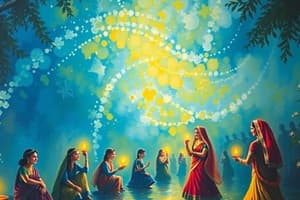Podcast
Questions and Answers
What type of festival is Diwali?
What type of festival is Diwali?
What is the significance of throwing colored powders and liquids during Holi?
What is the significance of throwing colored powders and liquids during Holi?
What is the duration of Ganesh Chaturthi celebrations?
What is the duration of Ganesh Chaturthi celebrations?
What is the purpose of Vratas?
What is the purpose of Vratas?
Signup and view all the answers
What is the significance of Raksha Bandhan?
What is the significance of Raksha Bandhan?
Signup and view all the answers
What is a common practice during Hindu festivals?
What is a common practice during Hindu festivals?
Signup and view all the answers
What is the purpose of Satsangs?
What is the purpose of Satsangs?
Signup and view all the answers
What can be found in a Mela during Hindu festivals?
What can be found in a Mela during Hindu festivals?
Signup and view all the answers
Study Notes
Types of Hindu Festivals
- Secular festivals: Celebrated by all Hindus, regardless of region or caste.
- Regional festivals: Unique to specific regions or communities.
- Seasonal festivals: Tied to agricultural cycles or natural events.
Major Hindu Festivals
- Diwali (Festival of Lights): Celebrates triumph of light over darkness, good over evil.
- Five-day celebration with fireworks, lighting diyas, and exchanging gifts.
- Holi (Festival of Colors): Celebrates arrival of spring, victory of good over evil.
- Throwing colored powders and liquids, bonfires, and festive gatherings.
- Navratri (Nine Nights): Celebrates feminine divine energy, Durga Puja.
- Nine-day celebration with garba and dandiya raas dances, fasting, and worship.
- Ganesh Chaturthi: Celebrates birth of Lord Ganesha, remover of obstacles.
- Ten-day celebration with idol worship, processions, and immersion in water bodies.
- Raksha Bandhan (Rakhi): Celebrates bond between brothers and sisters.
- Sisters tie rakhi threads on brothers' wrists, symbolizing protection and love.
- Makar Sankranti: Celebrates winter solstice, beginning of longer days.
- Holy bath in rivers, exchange of gifts, and festive gatherings.
Common Practices
- Pujas (worship): Offerings to deities, often with flowers, fruits, and sweets.
- Vratas (fasting): Abstinence from food and drink, or specific foods, for spiritual growth.
- Satsangs (spiritual gatherings): Congregational singing, prayer, and spiritual discourse.
- Mela (fairs): Temporary markets selling festive items, food, and drinks.
Types of Hindu Festivals
- Hindu festivals are categorized into three types: secular festivals, regional festivals, and seasonal festivals.
Major Hindu Festivals
- Diwali: A five-day celebration that marks the triumph of light over darkness and good over evil, accompanied by fireworks, lighting diyas, and exchanging gifts.
- Holi: A festival that celebrates the arrival of spring and the victory of good over evil, marked by throwing colored powders and liquids, bonfires, and festive gatherings.
- Navratri: A nine-day celebration that honors the feminine divine energy, Durga Puja, and features garba and dandiya raas dances, fasting, and worship.
- Ganesh Chaturthi: A ten-day celebration that commemorates the birth of Lord Ganesha, remover of obstacles, marked by idol worship, processions, and immersion in water bodies.
- Raksha Bandhan: A festival that celebrates the bond between brothers and sisters, where sisters tie rakhi threads on brothers' wrists, symbolizing protection and love.
- Makar Sankranti: A festival that marks the winter solstice, celebrating the beginning of longer days, accompanied by holy baths in rivers, exchange of gifts, and festive gatherings.
Common Practices
- Pujas: Offerings to deities are made with flowers, fruits, and sweets as a form of worship.
- Vratas: Fasting or abstinence from specific foods and drinks is practiced for spiritual growth.
- Satsangs: Congregational singing, prayer, and spiritual discourse take place in spiritual gatherings.
- Mela: Temporary markets are set up during festivals, selling festive items, food, and drinks.
Studying That Suits You
Use AI to generate personalized quizzes and flashcards to suit your learning preferences.
Description
Explore the different categories of Hindu festivals, including secular, regional, and seasonal celebrations, and learn about the significance of major festivals like Diwali and Holi.




